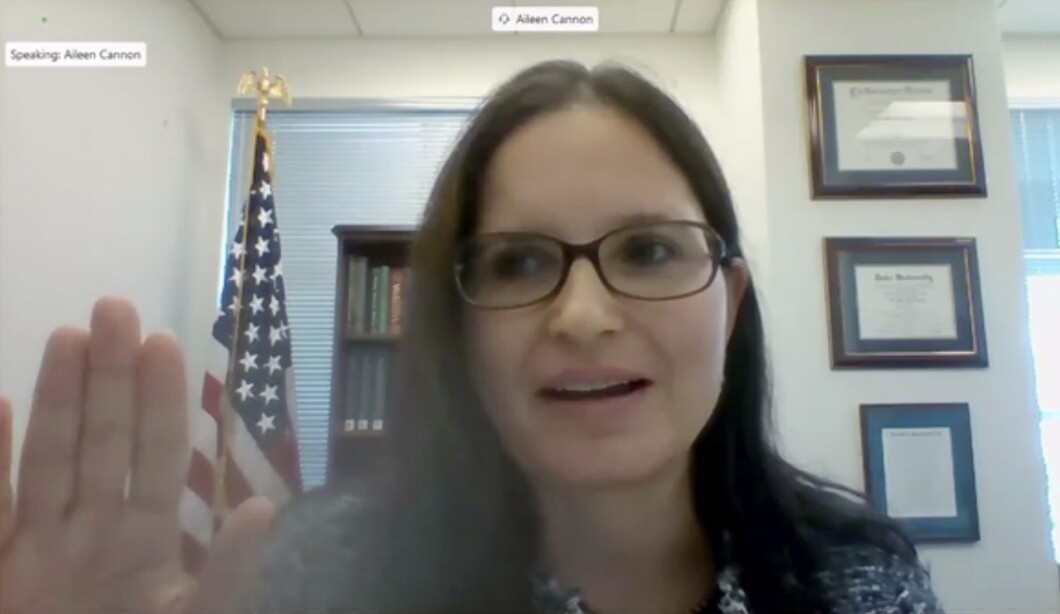
U.S. District Judge Aileen Cannon, the Florida judge overseeing former President Donald Trump‘s trial over his alleged mishandling of classified documents, made two errors, including depriving a defendant of his Sixth Amendment rights, during a recent trial in June, legal experts say.
The 42-year-old judge, appointed by the former president, presided over a trial in June for defendant William Spearman, who was facing charges of child exploitation and advertising and distributing child pornography. Although the outcome of the case resulted in a plea deal, she deprived Spearman of his Sixth Amendment rights to a public trial and neglected to swear in a jury pool.
DONALD TRUMP INDICTED: JACK SMITH LOCKED EYES WITH FORMER PRESIDENT DURING HISTORIC ARRAIGNMENT

Cannon disallowed members of the public, including Spearman’s family members, from being inside the courtroom during jury selection, according to a transcript obtained by Reuters. Her reasoning cited a lack of space inside the courtroom despite requests from the defense attorney and the prosecutors to allow them inside the room.
The Sixth Amendment guarantees the rights of a criminal defendant, including the “right to a speedy and public trial.” When the defense attorney told Cannon her refusal to allow the family violated constitutional rights, Cannon said: “All right, thank you. Your objection is overruled.”
The judge then had to restart the jury selection because she discovered she never swore in the jury pool, an essential procedure in which people who may serve on the panel pledge to tell the truth during the selection process. Cannon only allowed the defendant’s family to come inside the courtroom following the selection.
Such errors in the trial did not affect the result of the case, as Spearman’s attorneys and prosecutors reached a conditional plea agreement before the jury selection restarted.
Kevin C. McMunigal, a criminal law expert and professor at Case Western Reserve University, told the Washington Examiner, “It’s surprising that she would forget something like that,” in response to neglecting to swear in the jury pool but noted it is more of “clerical” error and that she “she is likely to learn from this.”
“I’ll bet you that she doesn’t in the future forget to swear in the prospective jurors,” McMunigal said.
As for her decision to disallow members of the public in the courtroom during the jury selection, McMunigal said, “She did exclude them for some part,” adding that the interesting question is “whether or not that really does constitute a constitutional violation.”
But because of the plea agreement, McMunigal said the fact that the case didn’t proceed to trial almost functioned as “sort of a Band-Aid. I mean, it will cover a lot of sins.”
Multiple legal experts have suggested that Trump’s trial over his charges of alleged mishandling of classified information would likely require a judge with key levels of experience, and they’ve noted that Cannon, who has been a federal judge since 2020, has not had experience in lengthy criminal trials or cases surrounding classified records.
However, one of those experts, Stephen Saltzburg, of George Washington University law school and a former Justice Department official, said that Cannon’s youth and greenhorn status as a judge could bring “energy to this” case.
CLICK HERE TO READ MORE FROM THE WASHINGTON EXAMINER
Last week, a third co-defendant was named in the classified documents case, and additional charges were brought against Trump, including attempting to “alter, destroy, mutilate, or conceal evidence”; inducing someone else to do so; and a new count under the Espionage Act after he was initially charged with 31.
The most recent co-defendant, Carlos de Oliveira, was arraigned on Monday but will be entering his plea on Aug. 10 after he was not able to obtain a local attorney in time for his arrest this week. He is facing felony charges related to allegations he conspired to delete surveillance footage at the property last year to prevent federal investigators from obtaining the footage.





